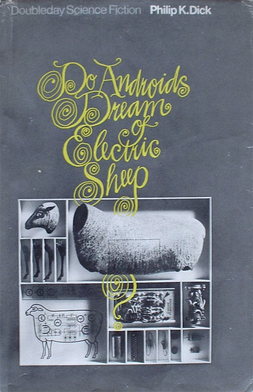
A tale as old as time – or at least the mid-twentieth century: Do androids really dream of electric sheep? is one told by Philip K. Dick in his novel.
I know from personal experience that one rarely dreams of sheep; my night visions consist primarily of missing the bus by mere seconds or finally getting the chance to kiss my crush. However, the aspect of dreaming has influenced writers since the dawn of time, extending its metaphorical reach into new themes of what dreams mean, mainly the aspect of wanting. New advances in technology have inspired countless writers to create new worlds and imagined futures that shine a flashlight on the way humans live, oftentimes based on our desires overriding our morals. No author has done this so memorably as Philip K. Dick.
In honor of the newest adaptation of Blade Runner – a spin-off inspired by Philip K. Dick’s dystopian novel, Do Androids Dream of Electric Sheep – coming to theaters in October 2017, I’ve decided to crack open the well-worn spine of this sci-fi thriller for the first time to prepare myself for what lies ahead.
The book’s hero, Rick Deckard, is an almost-retired bounty hunter looking for one last hunt before he calls it quits. In a dystopian future of Earth, artificial intelligence in the form of humanoid slaves has made colonial life on Mars all the more bearable for the humans lucky enough to escape the mostly deadened landscape. However, a scant population of low-income and/or mutated humans remain and their prized possessions are the animals that have mostly died out. If they can’t afford an animal to care for, those trying to fit in among their peers often buy realistic electronic animals as a substitute.
Among these socially-obsessed humans are fugitive androids trying to blend in and live a normal life. One of the few lucrative jobs on Earth has become hunting these androids, and no one does it quite as well as Rick Deckard. He hopes to find these high-value threats before turning in the towel. At one point (among many throughout the novel), Deckard notes the importance of empathy and a reliance on another to survive, something that the androids don’t need:
“Evidently the humanoid robot constituted a solitary predator” (page 24).
This was before the book began to battle the moral implications of killing and empathy, but I won’t spoil too much.
The first rendition of Blade Runner in the 1980’s did a fairly decent job of representing the book: the cast was all there, the action was intense, and the moral issues surrounding artificial intelligence was explored with a strong magnifying glass. With the onset of a new version of the tale about to hit the screens for the first time in over thirty years, a new generation of individuals will have the chance to read Dick’s book, like myself, for the first time, either in preparation for the new film or because it has given us a chance to look backward.
This book raises many questions: what role does empathy play in our lives? How do emotions (or lack thereof) affect us? And most importantly: what makes us human? Philip K. Dick does this with an artfully crafted science fiction twist that introduces its readers to a familiar, yet nuanced landscape.
In this time of political uncertainty, issues regarding human identity are especially poignant and important. We need to form catalysts that allow room for reflection. This book uses artificial intelligence as a way to open the door for discussion. As a leader in its field, this book cannot be missed.
Reviewed By: Marley Derosia
